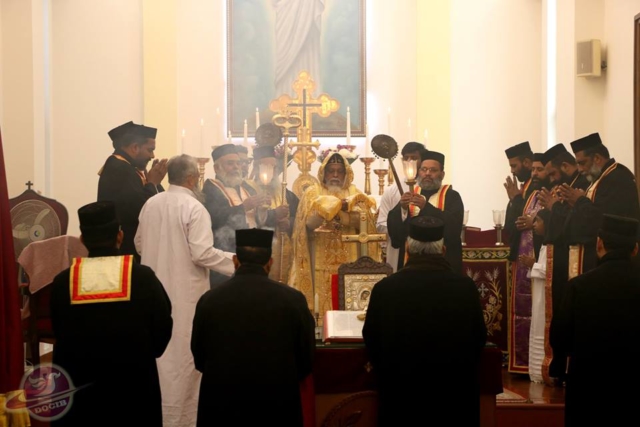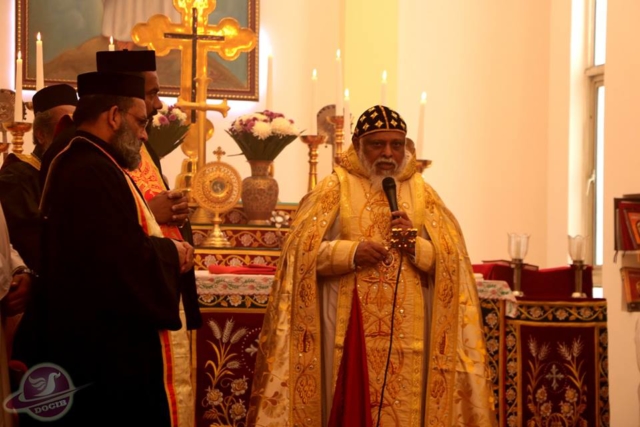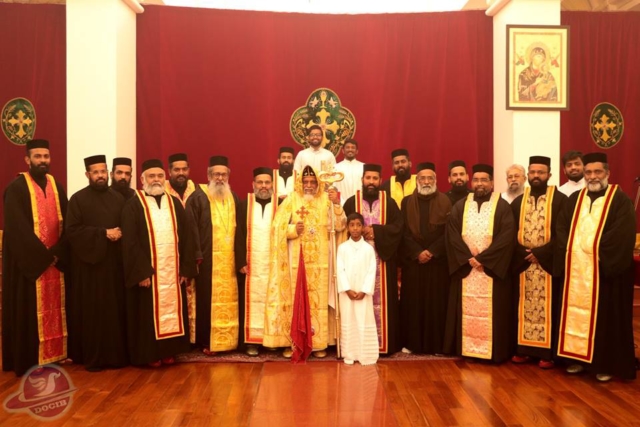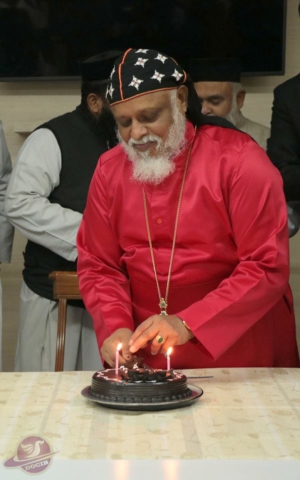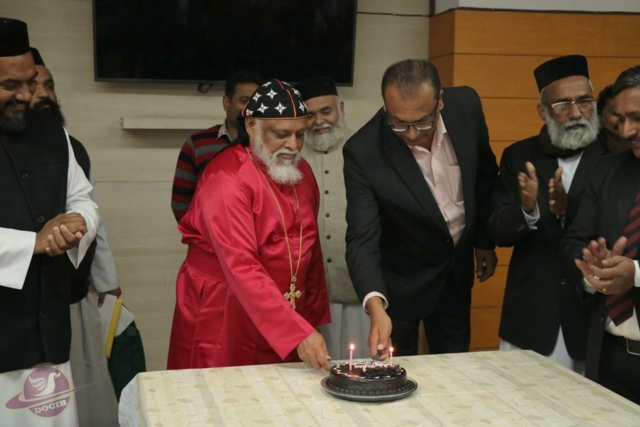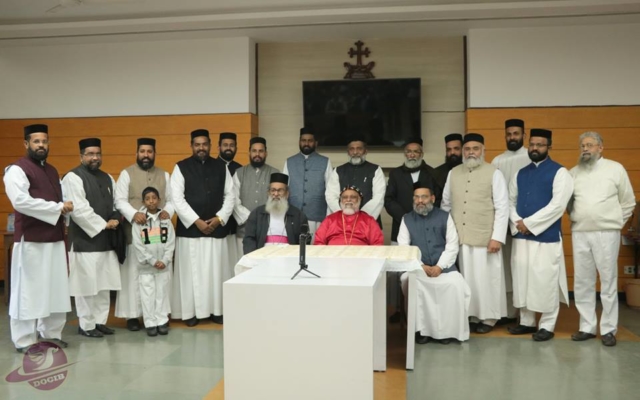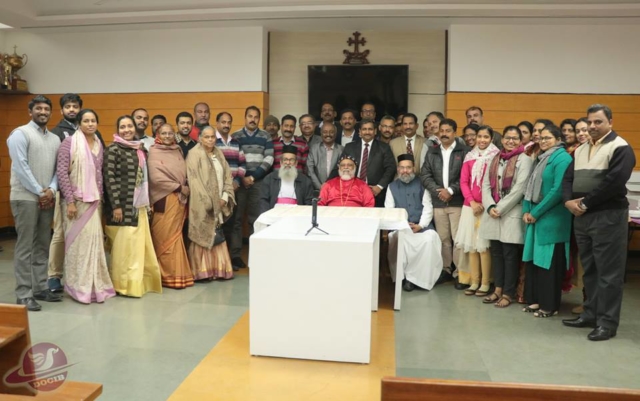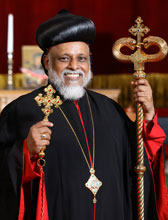Category: Others
Catholic-Oriental Orthodox Churches Annual Dialogue Commission being held at Rome from 27th January – 2nd February 2019
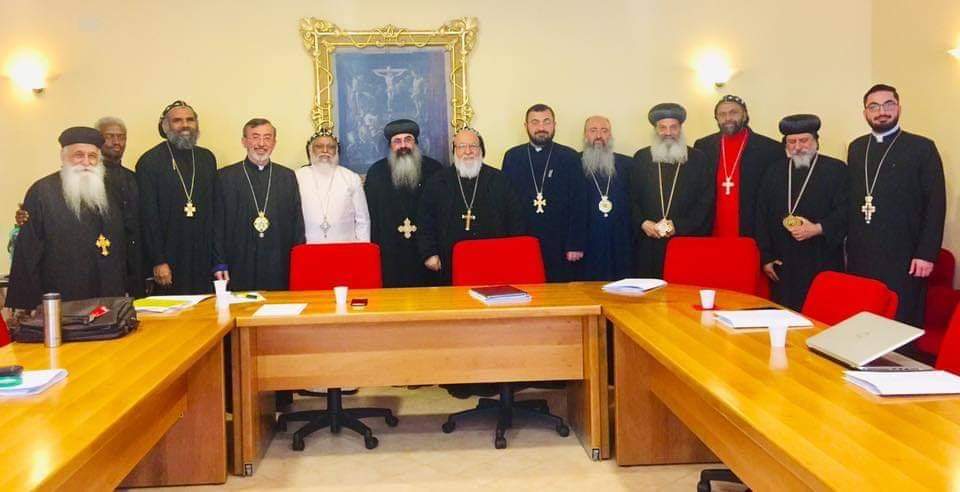
The Theme of this year’s Dialogue is the ‘Sacrament of Marriage – points of Convergence between the Catholic and the Oriental Orthodox Churches‘. H.G. Dr. Zachariah Mar Nicholovas & H.G. Dr. Youhanon Mar Demetrios representing from Malankara Orthodox Church for the Dialogue
HG Dr. Youhanon Mar Demetrios will be presenting the paper for the Malankara Orthodox Church.
YOUTH FEST 2019
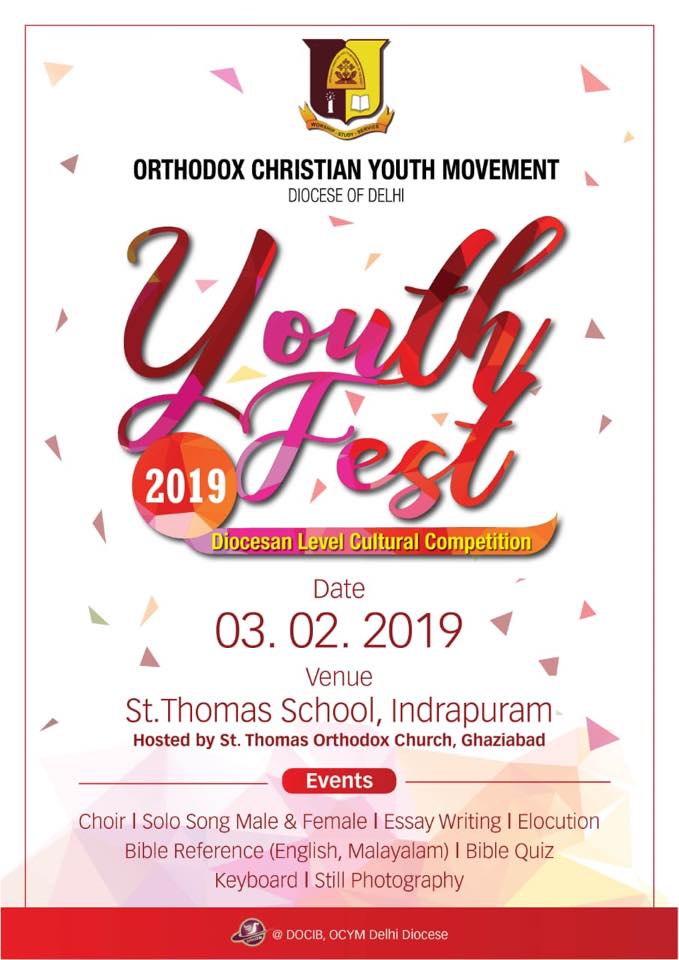
‘YOUTH FEST’, an annual Cultural Competition of Orthodox Christian Youth Movement(O.C.Y.M.), Diocese of Delhi will held at St. Thomas School, Indirapuram on Sunday, 03 Feb’19 from 10:00 AM onwards. Participants from different Parishes under Delhi Diocese will gather for the event.
Mr. Alexander Daniel, rtd. IPS will inaugural the Competition.
For more info, click on: https://www.facebook.com/docibdelhi/
Our Diocesan Metropolitan, Mar Demetrios Birthday Celebration at St. Mary’s Cathedral, Hauz Khas (18 Dec’18)
Our Diocesan Metropolitan, H.G. Dr. Youhanon Mar Demetrios celebrated his birthday with Holy Qurbana and thereafter a small celebration at St. Mary’s Orthodox Cathedral, Hauz Khas on 18 Dec’18. Reverend clergies, office bearers of spiritual organisations and people from surrounding parishes gathered for it.
Distribution of Relief Materials collected from Delhi done at Thiruvalla



Stem Cell Donation Registration Camp organised by OCYM, Ghaziabad on 22 July’18

OCYM, Ghaziabad in association with DATRI, the Blood Stem Cell Donors Registry made a Public Drive for STEM CELL DONATION REGISTRATION Camp for it’s parish members on 22 July’18.



ARETE 2018

Annual Day celebration of M.G.O.C.S.M Delhi Diocese with Olive Prize distribution, Metropolitan Award for Best Unit(2017-18) and the students who had successfully completed class 12th were felicitated on 01 July’18 at Mar Gregorios Orthodox Church, Noida.
And New Office Bearers for MGOCSM DELHI DIOCESE(2018-19) were elected on the same day.

General Secretary: Shaina Paul
Jt Secretary: Aaron John
Treasurer: Issac V Samson
Media Secretary: Jinsen John
Worship Secretary: Josna Joseph
Study Secretary: Sheba Varghese
Service Secretary: Jobin John
Prayatna Team:
Chief Editor: Shijo Mammen
Sub Editor: Minu Mathew
Gregorian Voice Coordinator:
Prince Koshy Daniel
Check out ARETE 2018, Event Album: https://www.facebook.com/mgocsmdelhi/
Metropolitan’s Message
Dearly Beloved,
“Travelling in Life and Travelling Guidelines”
One of the most familiar and appealing similes of life is travel, how our birth points to its starting point and death marking its terminus, but with the anticipation of its ultimate joyful destiny of union with God in heaven. Therefore, it comes as no surprise that it is a theme that resonates in many sections of the Holy Scriptures, commencing with Adam and Eve’s expulsion from the Garden of Eden and closing with their future restoration to it in through their promised redemption through Jesus Christ (Gen 2:7-3:24). Then, there is the saga of the sojourn of Abraham and the Patriarchs (Gen 12:1ff), the more gripping story of Israel’s liberation from Pharaoh and Egypt and eventual domicile in Canaan (Ex 1:1ff). It comes as no surprise that the author of the Epistle to the Hebrews reprises this theme several times in his letter (Heb 3:7-19; 4:1-16; 6:1-20; 12:1ff). Added to this is the fact that Jesus’ Parable of the Good Samaritan (St. Lk 10:25-37) was exhaustively quarried to produce sermons about life as a journey by reputed Church Fathers.
It seems appropriate, then, to appropriate this theme of life as a journey at the beginning of another new year, another new decade. Two points can be proposed without further elaboration-the point of origin of this journey and its conclusion-they both belong to God alone. That is why the glorified Christ can claim that He is the Alpha and the Omega (Rev 1:8, 11, 17). While humankind often finds the circumstances of their birth, and even more so of death questionable, it must be impressed that in His infinite wisdom that surpasses all understanding He has determined what is the optimum situation for each person. Parents are not infallible; yet it must be perceived that God has placed them in their position to provide what is necessary for each person. It is precisely through such a situation generated that each person understands how to grow and attain one’s destiny. Again, while in several instances a person’s death is precipitate and tragic, nonetheless, it transpires with God’s foreknowledge, never without it (Rom 8:28-30). The ultimate result is that all events transpire for the good and in accordance with God’s blueprint for the transformation of His creation (Is 65:17; 66:22; II Pet 3:11; Rev 21:1).
But there are specific directions that function as guideposts in our travel in our earthly journey. We could summarise them as follows: 1) An absolute dependence on God our Father to supply all our needs, 2) the character of our travelling companions, and finally, 3) the nourishment we consume for our journey. An elaboration of these points would provide us food for thought.
1) An Absolute Dependence on God our Father for All our Needs: From a God Who is portrayed as reigning in a distant heaven to a loving Father Who is always near and dear to us is the corrected experience presented by Jesus in announcing the imminence of the Kingdom of God. It is in this fashion that He taught His followers to call God “Abba” (St. Mt 6:9; St. Lk 11:2), an endearing term favoured by the early Christians (Rom 8:15; Gal 4:6). Calling God as “Abba” means that we fully recognise the fact that God is our Father, who is able to supply all our wants, even before we ask Him for them (St. Mt 6:22-32; St. Lk 12: 22-30; I Pet 5:7); the only proviso being that the demands of the Kingdom of Heaven/God is given the highest priority. This is the reason that Jesus exhorts the apostles to desist from making measures for their evangelistic journey (St. Mt 10:9-10; St. Mk 6:8). Instead of depending on our Father for all our needs (and this is different from what are our wants), we rely more on the surety of our physical resources and assets. It is only when we have exhausted these that we turn to God. But this is not what Jesus teaches; dependence is absolute reliance on God, in the faith that He knows what is best for us and provides for them accordingly. So, then, why does give us our assets? To provide a channel for God to perform miracles in the lives of others. This is how God responds to the prayers of His followers; He motivates us to share what has been given to us so that others can experience the love and providence of God.
2. The Character of our Travelling Companions: Once again it is our physical friends, we rely on most for the emotional support in our journey. We encircle ourselves with those who are best suited to our likes and provide support when we face crises. But what about the circle of friends that surround us, but are invisible? We call them saints, but they are our close travelling companions who constantly mediate for us to God for our well-being and our safety in our earthly journey. Consider carefully the meaning of Hebrews 12:1, where such a cloud of our faith ancestors are our co-travellers who support us in unseen ways to complete our journey. So, no matter what the trials and tribulations we endure, they have suffered them too; because of their experiences they now surround and strengthen each one of us and our community in its journey. Isn’t this why we pray for their intercession? Isn’t this the reason why we make pilgrimages to Parumala and other centres? Are we not strengthened in our faith when our petitions are answered by God through their intercessions? This calls for a realignment of whom we call “friends”. While we cannot have social existence without our visible friends, nevertheless, we must seek a closer relationship with this “cloud of witnesses” who are one step closer to God and continue to intercede for us to Him.
3. The Nourishment We Consume for our Journey: Consumption of actual food no longer seems to be a major item of interest to most people these days due to various factors. But what has become the most engrossing activity is our obsession with our handsets. We just cannot manage without the comforting presence of our handsets in our hands, and it would appear that it is almost as if we had lost a limb if it is not in our physical possession. And we have become undiscriminating consumers of whatever is proffered by the social media, no matter how baseless and destructive the matters are. Not only that, most people have a tendency to forward these messages to all and sundry, with little or no thought of the destructive impact these might have on others. In doing so those involved in this process unwittingly become part of the nefarious web that is spun by the social media. All the more is it necessary, therefore, to ensure the truth of the messages we receive, to subject them to verification before we accept them ourselves. In this manner alone can we prevent ourselves from becoming part of the darkness that is the character of this world.
True, we are travellers. Even so, it our responsibility to ensure that we follow the true path and to be sure that we reach our destined goal. And the above three guideposts are like lights that show us the straight and narrow path we have to traverse before we reach our heavenly home. Let us keep them in mind as we navigate through 2021.
Met Dr. Youhanon Mar Demetrios
Thought for the Month
The Silver Lining in the Cloud
“Our sincerest laughter
With some pain is fraught;
Our sweetest songs are those
that tell of saddest thought.”
-Percy Bysshe Shelley, Ode to a Skylark
As we anxiously labour under the cloud of COVID-19, we wonder when this virus will be eradicated, and what precisely is God’s intend in all this. And with the infection showing no signs of abatement, the situation becomes a fertile ground for all kinds of doomsday predictions. Amidst all this, when we raise our eyes to God for answers, we are reminded that there are no accidents with God; in fact, for those who trust and have faith in Him, all things work for good. As St. Paul writes,” We know that all things work together for good for those who love God, who are called according to His purpose” (Rom 8:28). Therefore, we have faith that God’s purpose which we cannot understand is working even in the midst of this viral infection to bring about a transformed heaven and a transformed earth. So, we ask ourselves the question: can any good come out of all this? For those with an abiding trust in God’s love, the response will surely be a categorical “Yes”! And so, while the cloud still hovers over us, we look for the proverbial silver lining that points to God continuing to work in these troubled times. Let us look at some of them.
- A Closer Walk with God: At no other point in the liturgical calendar of the Church is there the awareness of God’s proximity than during the Lent. The fast, the selected readings from the Holy Scriptures, the special services and meditations, all create in us an experience that we are walking closer with God. In fact, for some members the Lent is like a spiritual dry cell, for they appear to store up a divine energy, for we never see them in the Church for the rest of the year! The viral infection has only intensified this experience, for we are at one stroke impressed with our mortality and sense that God alone can remove this sickness, a theme that is reiterated in the hymns and prayers of this period. Burdened as we are with a deep sense of helplessness, we have now turned to God with the conviction that He alone can save us from this situation. It is true that we have been deprived of our freedom to worship God in our churches. But that too deeply impresses upon us what we took for granted, that the joy of our Christian fellowship that follows our corporate worship on Sundays is also a gift from God. All this has only made profound our prayers as we raise up our feeble hands to God for salvation, not only from this virus, but also from the disease of sin. Yes, our prayers become more poignant because we now pray with a conviction that God alone can save us from our dreadful situation. Now in the confines of our homes and out of sight of others, we now raise our spiritual worship (Rom 12:1) to God, in a way finding truth in the promise of Christ that when we pray in secret, our heavenly Father will see us in secret and reward our prayers (St Mt 6:6). In a way, the loss of public worship in our churches has been ameliorated by a deep personal proximity to God, an experience we would not have attained without the presence of this virus. Truly, our sense that our entire being is being permeated by the love and presence of God is a blessed outcome of our predicament.
- Retrieving the Tradition of Family Prayers: But that is not all! What about a tradition that all but disappeared from our homes, what with its fast-changing social mores. For once the veracity of the old adage, that a family that prays together, stays together is driven home with a strong conviction. The deprivation of church services now serves to bring the family together around the feet of God and there as a family we begin to renew a closeness that was rarely seen before. The family is truly the undergirding unit of the parish, the place where God is first experienced, where prayer life is taught and a new generation finds its roots in God and the Church. Devoid of this foundational spiritual bedrock, our young men and women become easy prey to new-found spiritual groups who teach instant spirituality. Now that tradition that had been consigned to oblivion has once more become a feature our family life as they gather together to pray, or even just to view the services on the YouTube. Somewhere in that process I am sure the family will find the chance to pray together. Perhaps, this enforced quarantine will have the salutary consequence of retrieving the tradition of family prayers so that it will become a perduring feature of our families.
An observation that will be made is that most of these services are in Malayalam and so remain unintelligible to many of our young men and women. Allow me to share my experience. I too grew up with little knowledge of my mother tongue. But that was not an impediment for my participation in the family prayers in my grandparents’ home. Even though I couldn’t understand them, the deep sense of being in prayer was always present. And I learned most of these prayers by heart as a result of these daily prayers. Today, they have become meaningful, as they are a rich source of my own prayer life. That, too, I pray will result from this coerced family prayer meetings. And it is when families experience difficulties that they draw closer together, a bond that will preserve their unity and cohesiveness well into the future.
- Regaining the Joy of Family Communications: Surely, there will come a time during this period when we tire of staring at the TV or being engaged with our handsets. And so, we will be forced to engage in talk with family members. Family members talking to each other is another casualty of our communication technological explosion. The paradox is that even as we spend more time in talking to friends and being engaged on social media sites, we rarely talk to family members, even at home. Now out of necessity we indulge in talking to one another. As the days pass, our conversation progresses from small talk to sharing our life stories, so that the bonds that keep a family together are strengthened. Fathers are able to spend quality time with their children and it is my hope that husbands and wives will also talk to each other. In fact, I hope that family members will put aside their handsets so that they can all come together to spend time in talking and sharing their life experiences.
One certain outcome of this lockdown is that families are compelled to have meals together. This used to be a welcome part of growing up in a family. But with the fractured life we lead, families are not always able to come together for meals. Now for a change all come together to share meals as a family. And the experience of sharing a meal as a family now become once more a happy occasion for all to talk and laugh over a good and delicious meal. Our nostalgic recollections should include such reminiscences of the family in later times, so that they can bring a wistful smile of delight to our faces.
- Managing with What We Have: The virtual curfew imposed all over the country has disrupted supply channels so that we have had to curtail our consumption to what is necessary or essential. Because we cannot avail of all what we wish for we are learning to manage with what is essential. What is prepared at home is carefully done so that we have cut down the waste. I recall my childhood days when every part of a pumpkin was served as some dish or other, without diminishing its taste. And there was little to waste, considering the food chain that was a regular feature of our homes in Kerala. Here in the NCR a whole new generation has grown up experiencing a life-style that minimises sacrifice and sharing. Most families enjoy a comfortable financial situation here in the NCR (this can be contested, but I offer this as a relative statement) which allows for a wider range of spending by the upcoming generation. In our changed circumstances there are the demands now for a changed pattern of living which places limits on what is spent, the food eaten and so forth. If nothing else, this upcoming generation will learn that controlling consumption is a virtue that needs to be cultivated. It is also a valuable experience for parents to impose some control, all aimed at enabling the family to become a happy, enriching and valuable learning experience for all.
- Sharing What We Have: The fasts of the Lenten season are not meant to be a goal in Itself, but an exercise in sharing what we have. Thus, the money saved by abstaining from food is to be collected and donated for the relief of those who are financially disadvantaged. Thereby, we learn the art of sacrificing and sharing what we have with others. This is an important lesson of the Lenten season. The onus is on the believer to find out those in need and to share a part of what God has given us with others. We live in a context where our unlimited consumption creates no compunctions in us. At least for a time, the sense that we have extravagantly utilised our assets should compel us to evaluate our life-style and see where we can sacrifice and share our assets with others. We should recall the observation of St. Paul, “In all this I have given you an example that by such work we must support the weak, remembering the words of the Lord Jesus , for he himself said, ‘It is more blessed to giver than to receive’ (Acts 20.35).”
If at the end of all this lockdown we could all so benefit from our difficulties, would that not be a welcome experience? Then, we could surely share the sentiments of Shelley which appears at the beginning of this article. Let us pray that this period will be a time of healing and learning to see the silver lining in the cloud of COVID-19.
Met. Dr. Youhanon Mar Demetrios


